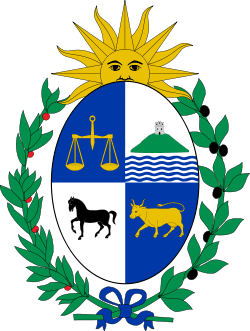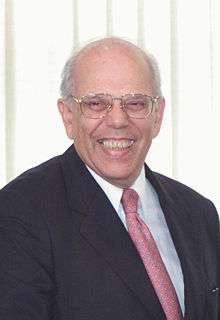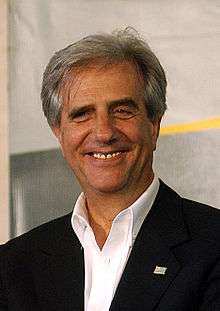Uruguayan general election, 1999
| | ||||||||||||||||||||||||||
| ||||||||||||||||||||||||||
| ||||||||||||||||||||||||||
| ||||||||||||||||||||||||||
 |
| This article is part of a series on the politics and government of Uruguay |
|
Legislative |
|
| Foreign relations |
|
See also |
General elections were held in Uruguay on 31 October 1999 alongside a double referendum, with a second round of the presidential election on 28 November.[1] The election resulted in a victory for the Broad Front – Progressive Encounter alliance in the General Assembly elections, together with a win for Jorge Batlle Ibáñez of the Colorado Party in the presidential election.
Results
Although Vázquez obtained a plurality of more than 7% over Batlle in the first round, in the second round roughly 90% of voters of Lacalle in the first round switched to Batlle (following the endorsement of the National Party in favour of the Batlle candidacy), enabling him to win the election with a comfortable 8% margin. In the parliamentary elections, the party of losing presidential candidate Tabaré Vázquez won the most seats, though they failed to gain a parliamentary majority.
| Party | Presidential candidate | First round | Second round | Seats | |||||
|---|---|---|---|---|---|---|---|---|---|
| Votes | % | Votes | % | Chamber | +/– | Senate | +/– | ||
| Broad Front–Progressive Encounter | Tabaré Vázquez | 861,202 | 40.1 | 981,778 | 45.9 | 40 | +9 | 12 | +3 |
| Colorado Party | Jorge Batlle Ibáñez | 703,915 | 32.8 | 1,158,708 | 54.1 | 33 | +1 | 10 | –1 |
| National Party | Luis Alberto Lacalle | 478,980 | 22.3 | 22 | –9 | 7 | –3 | ||
| New Space | Rafael Michelini | 97,943 | 4.6 | 4 | –1 | 1 | 0 | ||
| Civic Union | Luis Pieri | 5,109 | 0.2 | 0 | 0 | 0 | 0 | ||
| Invalid/blank votes | 57,735 | – | 65,626 | – | – | – | – | – | |
| Total | 2,204,884 | 100 | 2,206,112 | 100 | 99 | 0 | 30 | –1 | |
| Registered voters/turnout | 2,402,160 | 91.8 | 2,402,135 | 91.8 | – | – | – | – | |
| Source: Nohlen | |||||||||

